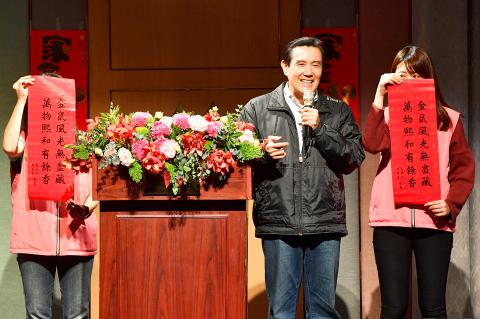China has to take responsibility for skewing the so-called “1992 consensus,” former president Ma Ying-jeou (馬英九) said yesterday, adding that Beijing omitted “different interpretations” and only focused on “one China.”
Ma made the remarks when asked about discussion within the Chinese Nationalist Party (KMT) following its losses in the Jan. 11 presidential and legislative elections about whether the party should improve or abandon the “1992 consensus.”
The “1992 consensus” — a term that former Mainland Affairs Council chairman Su Chi (蘇起) in 2006 admitted making up in 2000 — refers to a tacit understanding between the KMT and the Chinese Communist Party that both sides of the Taiwan Strait acknowledge that there is “one China,” with each side having its own interpretation of what “China” means.

Photo: CNA
“Both Taiwan and the Mainland have agreed to the consensus — otherwise, there would be no consensus. I think everyone misunderstands the consensus. It is, of necessity, a Taiwanese consensus and also one across the Taiwan Strait — only then would it have any effect,” Ma said yesterday.
The “consensus” benefits Taiwan by offering it flexibility and echoing the “one China” principle as stated by the Republic of China (ROC) Constitution — both of which enable cross-strait interaction, Ma added.
“I think the Mainland has to take certain responsibility for the misunderstanding, as it has placed too much emphasis on ‘one China’ and forgets there is the component ‘each side having its own interpretation,’” Ma said, adding that not clearing up the matter would make cross-strait relations increasingly difficult.
In a related development, KMT Youth League head Hsiao Ching-yan (蕭敬嚴) on Friday proposed that the party should move away from pro-unification discourse.
Taiwanese have “achieved consensus in refusing to acknowledge the legitimacy of the 1992 consensus,” Hsiao said in an interview with the China Review News Agency, adding that the party should find a new consensus, one that is anti-unification.
While acknowledging that his view was similar to the Democratic Progressive Party’s (DPP), Hsiao said that, based on his observations, any variation of the “1992 consensus” — as long as it contained the same “one China with separate interpretations” spirit — would likely be rejected by Taiwanese.
Hsiao added that his observations showed that Taiwanese agree with three concepts: “the ROC is in Taiwan,” “independent sovereignty should not be violated” and “unification should be adamantly opposed.”
Given this, Hsiao urged the party to base its cross-strait discourse on these three concepts.
However, KMT Central Advisory Committee member Chang Ya-ping (張雅屏) slammed Hsiao’s suggestion.
The KMT is “the defender of the ROC” and the Constitution is the “Constitution of the ROC,” which supports the “one China” ideology, Chang said.
The KMT must defend the Constitution and becoming anti-unification is to “deny the legitimacy of the ROC Constitution,” he said, adding that any person who refuses to defend the Constitution should resign from the KMT.
An Internet user said that it was perplexing that such a good idea from Hsiao — one that could win the party votes from the younger generation — should be met with such hostility by the party’s leadership.
Pro-unification supporters in the KMT should leave Taiwan, another netizen said.

The High Prosecutors’ Office yesterday withdrew an appeal against the acquittal of a former bank manager 22 years after his death, marking Taiwan’s first instance of prosecutors rendering posthumous justice to a wrongfully convicted defendant. Chu Ching-en (諸慶恩) — formerly a manager at the Taipei branch of BNP Paribas — was in 1999 accused by Weng Mao-chung (翁茂鍾), then-president of Chia Her Industrial Co, of forging a request for a fixed deposit of US$10 million by I-Hwa Industrial Co, a subsidiary of Chia Her, which was used as collateral. Chu was ruled not guilty in the first trial, but was found guilty

DEADLOCK: As the commission is unable to forum a quorum to review license renewal applications, the channel operators are not at fault and can air past their license date The National Communications Commission (NCC) yesterday said that the Public Television Service (PTS) and 36 other television and radio broadcasters could continue airing, despite the commission’s inability to meet a quorum to review their license renewal applications. The licenses of PTS and the other channels are set to expire between this month and June. The National Communications Commission Organization Act (國家通訊傳播委員會組織法) stipulates that the commission must meet the mandated quorum of four to hold a valid meeting. The seven-member commission currently has only three commissioners. “We have informed the channel operators of the progress we have made in reviewing their license renewal applications, and

Taiwan People’s Party (TPP) Chairman Huang Kuo-chang (黃國昌) yesterday appealed to the authorities to release former Taipei mayor Ko Wen-je (柯文哲) from pretrial detention amid conflicting reports about his health. The TPP at a news conference on Thursday said that Ko should be released to a hospital for treatment, adding that he has blood in his urine and had spells of pain and nausea followed by vomiting over the past three months. Hsieh Yen-yau (謝炎堯), a retired professor of internal medicine and Ko’s former teacher, said that Ko’s symptoms aligned with gallstones, kidney inflammation and potentially dangerous heart conditions. Ko, charged with

Taiwan-based publisher Li Yanhe (李延賀) has been sentenced to three years in prison, fined 50,000 yuan (US$6,890) in personal assets and deprived political rights for one year for “inciting secession” in China, China's Taiwan Affairs Office spokesman Chen Binhua (陳斌華) said today. The Shanghai First Intermediate People’s Court announced the verdict on Feb. 17, Chen said. The trial was conducted lawfully, and in an open and fair manner, he said, adding that the verdict has since come into legal effect. The defendant reportedly admitted guilt and would appeal within the statutory appeal period, he said, adding that the defendant and his family have